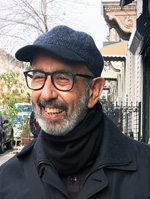By Michael Ginsberg

LOUISVILLE, Kentucky — Sixty years ago, on Rosh Hashanah, my father taught me a lesson about giving. Thirty years later, I learned another valuable lesson about giving. Both apply to Rosh Hashanah and Yom Kippur – the Days of Awe – when we examine what we have given and taken in our own lives.
My father imparted his lesson in 1961 as we sat on the men’s side of the sanctuary at Judea Center, our ortho-conservative synagogue in Brooklyn. I was 13. Back then, we had to buy tickets to services and were assigned seats, with men on one side of the aisle, women on the other. My mother and sister stayed home.
As the rabbi’s sermon ended, the doors in the back of the sanctuary were closed and the president of our congregation (a position my father had held more than once) greeted us from the bima, holding a sheet of paper that turned out to be a seating chart. The president talked about giving, then proceeded to call out names from his chart, one at a time, asking congregants for donations.
It was a first for Judea Center, and it caused quite a buzz. It also caused some obvious competition, as one member’s shouted “chai” was frequently followed by “twice chai,” occasionally accompanied by good-natured bantering. Everyone was giving.
The president eventually called out, “Percy Ginsberg.” My father stood up and shouted, “Nothing.”
The congregation erupted in chatter, and the president – clearly rattled – stammered, “Sorry, Percy. I didn’t hear that.” My father repeated, “Nothing,” a little louder, and the buzz increased in volume. After some awkward silence, the president called the next name and the procedure continued.
As we walked home, I asked my father why he refused to contribute. He said giving is important for its own sake, not for drawing attention to the donor. When we arrived home, for lunch, he told my mother what he had done, and why.
My mother wouldn’t buy it.
“Percy,” she said, “you do so much for the synagogue and give so much; is it so terrible for people to know how generous you are? Instead, they now think we’re cheapskates.”
My father said nothing, but I could tell how pleased he was to have stirred up the synagogue. My mother just shook her head. This is the same woman who insisted on leaving price tags on gifts.
I gradually came to understand and admire my father’s sense of honesty, compassion and humility, all of which he had demonstrated many times, including that Rosh Hashanah day, 60 years ago.
I didn’t learn until later that Dad, something of a scholar of Judaism, may have been influenced by Maimonides, the 12th century Jewish physician/philosopher who developed a scale for giving. The higher levels are reserved for giving anonymously, without being asked, which fit my father.
My turn at gift giving came a few years later, but I didn’t appreciate its significance until 2005, when I received a surprise phone call at home in Louisville.
“You probably don’t remember me,” the caller said. “I’m Mark (not his real name), and we were classmates in high school and in Hebrew school.”
I recognized the name. Mark had lived in a brownstone house, one block from our apartment building. We knew each other but were not close friends, nor had I seen him since high school graduation, in 1965.
“My father died when we were in high school, and you paid a shiva call to our house,” Mark said. “Pastry and all. You were the only one I knew from school or the neighborhood to show up.”
Mark continued: “Every year, on the anniversary of my father’s death, I stop to think about him, and I remember you, too. This year, I finally decided to find you and thank you.”
Mark and I continued to talk, catching up on each other’s lives. We swapped contact information, and I invited him to visit Louisville on Derby weekend.
For several years after that call, Mark and I sent each other New Year’s cards, but that was all. That is, until my daughter, Perry, was choosing a college. One of the finalists was Rutgers University in New Brunswick, New Jersey, near where Mark and his wife lived. I called him and set up a dinner date to coincide with our campus visit.
Perry and I had a delightful time, swapping stories of school and teachers. Mark insisted on paying. We left with more promises to get together again, but Perry didn’t attend Rutgers, and Mark and I have not seen each other. I continue to hope we will work out a visit.
I’m still overwhelmed by the impact that my shiva call had on Mark. I think my father would be proud of me. He would also ask why I continue to tell the story.
I don’t have an answer.
*
Michael Ginsberg, Ph.D, is a professor of English and a freelance writer based in Louisville, Kentucky.